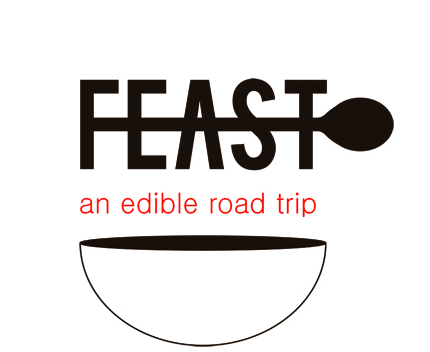Island Forest Foods
Permaculture is a type of farming that seeks to mimic natural ecosystems to create self-sustaining, produce-yielding ecosystems. They are designed to decrease inputs, such as sprays, fertilizers, and labour. The first 4-5 years are the most labour intensive, with very low yields, but once the system is in place, the natural cycles take over so the farm is relatively self-sustaining.
Early one sunny afternoon, we arrived at their farm, Island Forest Foods. We hopped into Darcy’s truck and perused some of their 200 acres of certified organic land, all while crunching away on two juicy apple-pears from their orchard. Currently, the farm has about 2,000 trees, shrubs and vines planted over 10 acres, all part of a trial farm they’re experimenting with before planting on more of 200 acres available to them. Most food grown on a commercial scale comes from monoculture crops, meaning that just one crop covers many acres of land. The problem with monoculture is that it creates a sort of ‘all-you-can-eat-buffet’ for the pests that like to feed on that particular crop. Since there is a lack of plant variety, often there are not enough natural predators to feed on the pests, and an outbreak can occur.
The orchards at Island Forest Foods are polyculture, meaning there are several different types of trees planted in one orchard, as well as cover crops including kale, herbs, and sorrel planted in between the rows. Planting a diversity of crops creates a strategic system where more animals can live and survive, therefore increasing the amount of predators. Monocultures would never naturally occur, and permaculture practices are partially founded on this truth.
At Island Forest Foods, they’ve planted what they call ‘northern exotic plants’, plants that can handle cold temperatures and PEI winters: (peaches, cherries, chums (cherry-plums), plums, apriums (apricot-plums), and plumcots (plum-apricots), for example. They’ve also been able to manage their geography by creating a micro-climate. The rows in between the trees contain trenches, which serve to collect water for the orchard plants. Any excess water runs down into a dug-out pond at the base of the property. The pond reflects sunlight and warmth back into the orchard, creating a micro-climate that allows for the growth of plants that wouldn’t typically survive in a northern climate. Brilliant!
It’s clear the Becks are committed to creativity and conservation. They’ve received several innovative farm grants to get their production going, but they are also working on projects that will reduce their overall energy consumption.
Darcy has built a few high efficiency, wood burning ‘rocket stoves’. These stoves have been popularized by Ernie and Erica Wisner, and are designed so the flames go sideways, with a vertical chamber that traps in the smoke, while releasing heat. It produces a massive amount of heat, without harsh smoke, and burns through about 80% less wood than conventional stoves. You can read more about the process here.
Darcy is also an artist, and has constructed a small studio out of rammed earth, an ancient architectural technique. PEI soil is excellent for this use and rammed earth is an ideal insulator. Despite these advantages, there is only one other house of its kind on the island, built in the 1940’s. Darcy’s dream is to build a whole house out of rammed earth, heated by a rocket stove.
We left this farm tour incredibly inspired and in awe, once again, of the many creative and hard-working farmers dedicated to feeding Canada. PEI should be proud to be the home of such a dynamic family, and an innovative farm.





